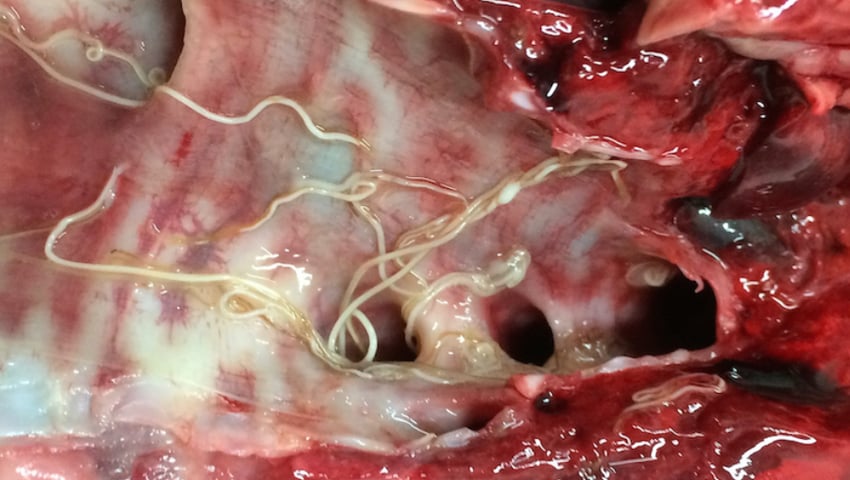The Control of Worms Sustainably (COWS) group has launched a survey for vets to find out more about lungworm and its treatment across the UK.
Through the survey, COWS hopes to learn more about when outbreaks of lungworm are occurring, what class of stock is most affected, what clinical signs are seen and how well they respond to treatment. This will help COWS track lungworm cases throughout the 2024 grazing season.
The survey can be accessed here and can also be found on the COWS website in the News section.
Helen Carty, Veterinary Centre Manager for the SRUC, said, “In recent years, we have been aware of reports of suspected lack of efficacy of wormers to treat lungworm infections in cattle. But no-one is sure whether this due to growing resistance of lungworm to the wormers or is it solely down to poor administration, such as under-dosing or inappropriate timing? Many farmers use a pour-on when they hear cattle coughing out in the fields. If the cough goes away, it is presumed that the wormer has worked. If they cough again, what should the farmer do? It can be hard to know if the cough is because lungworm are still present, or have the cattle developed a bacterial infection because their lungs were damaged.”
Following a VMD-supported industry workshop held by COWS at Moredun in March 2023, it was recognised that taking a standardised approach to assessing wormer efficacy will help understand these issues.
COWS has devised a pro-forma on Survey Monkey for vets to fill in and submit when they come across cases of lungworm. The collated, anonymised data from the survey will be used to form the basis of future discussions around the issue.
Carty said, “We would like vets to supply information from lungworm outbreaks, tell us about any testing undertaken and response to treatment. We are not expecting to see a lot of survey forms coming in until the second half of the grazing season but want vets to be aware that the survey is available. The priority at the moment is for young cattle to be vaccinated before turnout if they are on farms with a high risk of lungworm.”
Where efficacy testing takes place, faecal samples are best collected on the day of treatment and 14 days later. Lungworms collected from post mortem can also be submitted to Moredun for further investigation. Details of how to take samples and where to send them to are outlined in the survey.
If there is a suspected lack of efficacy, vets are asked to ensure the VMD and pharmaceutical company are notified.
The results of the survey will be released in 2025.
Steps you should be taking now to protect your herd From lungworm
Beef:
- Where there is risk of lungworm infection, based on farm history, buying-in policy etc, consider vaccinating youngstock before turnout. For older stock, do a risk assessment with the vet.
- For second season calves, monitor liver and rumen fluke by faecal egg counting before turnout. If necessary, treat with an appropriate product to kill adult fluke. Speak to the vet or SQP/RAMA about which product to use.
- If possible, turn out first grazing season cattle, such as dairy x beef calves and autumn-born weaned suckled calves, onto low risk pasture, eg not grazed by cattle last year. If using pasture grazed by youngstock last year, consider carrying out faecal egg counts for gut and lung worms. Only treat when necessary, rather than relying on doses of wormer throughout the season.
- Spring-born suckler calves that are still suckling are not likely to need any treatment for worms. Any larvae on the pasture will be consumed by their mothers which will be mostly immune.
Dairy:
- Where there is risk of lungworm infection, based on farm history, buying-in policy etc, consider vaccinating youngstock before turnout. For older stock, do a risk assessment with the vet.
- For second season heifers, monitor liver and rumen fluke infection by taking faecal egg counts before turnout. If necessary, treat with an appropriate product to kill adult liver fluke. Speak to the vet or SQP/RAMA about which product to use.
- Monitor liver and rumen fluke by faecal egg counting before turnout. If necessary, treat with an appropriate product to kill adult fluke. Speak to your vet or animal health advisor about which product to use.
- If possible, turn out first grazing season calves such as replacement heifers, onto low risk pastures, e.g. pastures not grazed by cattle last year. If using pasture grazed by youngstock last year, consider carrying out faecal egg counts for gut and lung worms. Only treat when necessary, rather than relying on frequent doses of wormer throughout the season.
Lungworm image: COWS
